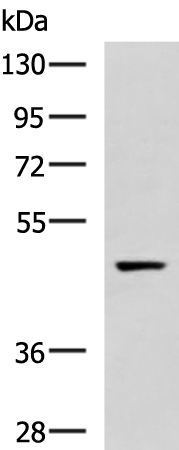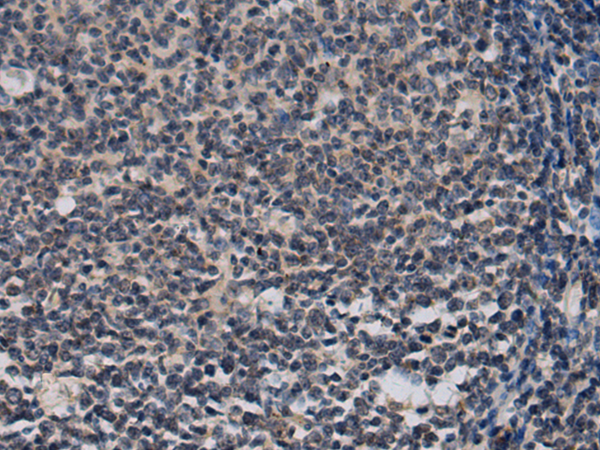

| WB | 咨询技术 | Human,Mouse,Rat |
| IF | 咨询技术 | Human,Mouse,Rat |
| IHC | 1/150-1/300 | Human,Mouse,Rat |
| ICC | 技术咨询 | Human,Mouse,Rat |
| FCM | 咨询技术 | Human,Mouse,Rat |
| Elisa | 1/2000-1/5000 | Human,Mouse,Rat |
| Aliases | AD-017; MSTP139 |
| WB Predicted band size | 42 kDa |
| Host/Isotype | Rabbit IgG |
| Antibody Type | Primary antibody |
| Storage | Store at 4°C short term. Aliquot and store at -20°C long term. Avoid freeze/thaw cycles. |
| Species Reactivity | Human, Mouse, Rat |
| Immunogen | Fusion protein of human GLT8D1 |
| Formulation | Purified antibody in PBS with 0.05% sodium azide and 50% glycerol. |
+ +
以下是3篇涉及GLT8D1抗体的研究文献摘要,基于近年研究整理:
1. **文献名称**:GLT8D1 mutations in familial amyotrophic lateral sclerosis: functional analysis of glycine-rich domain variants
**作者**:Cooper-Knock J, et al.
**摘要**:该研究在家族性肌萎缩侧索硬化症(ALS)患者中发现GLT8D1基因突变,并利用特异性抗体检测突变蛋白的亚细胞定位及糖基化活性变化,揭示了其异常功能与神经退行性疾病的关联。
2. **文献名称**:Glycosyltransferase GLT8D1 expression correlates with glioma malignancy grade and immune infiltration
**作者**:Zhang Y, et al.
**摘要**:通过免疫组化(使用兔源GLT8D1多克隆抗体)分析胶质瘤组织样本,发现GLT8D1蛋白表达水平与肿瘤恶性程度正相关,且可能通过调控肿瘤微环境中的糖基化修饰影响免疫细胞浸润。
3. **文献名称**:Development and validation of a GLT8D1 knockout mouse model for in vivo functional studies
**作者**:Wang L, et al.
**摘要**:研究构建了GLT8D1基因敲除小鼠,利用Western blot(兔抗GLT8D1单克隆抗体)验证蛋白缺失,发现该基因缺陷导致小鼠运动神经元发育异常,提示其在神经系统中的关键作用。
注:GLT8D1研究相对较少,部分文献可能侧重于基因功能而非抗体应用。如需具体实验抗体信息(如货号、供应商),建议通过抗体数据库(如CiteAb)进一步检索。
The GLT8D1 (glycosyltransferase 8 domain-containing protein 1) antibody is a research tool designed to study the function and expression of the GLT8D1 protein, a member of the glycosyltransferase family. GLT8D1 is implicated in glycosylation processes, particularly in the biosynthesis of gangliosides—glycolipids critical for cell membrane structure and neuronal signaling. Interest in GLT8D1 surged after genetic studies linked mutations in the GLT8D1 gene to familial amyotrophic lateral sclerosis (ALS), a neurodegenerative disorder, suggesting its role in maintaining motor neuron health.
GLT8D1 antibodies are primarily used in biomedical research to detect protein expression levels via techniques like Western blotting, immunohistochemistry, or immunofluorescence. These antibodies help elucidate GLT8D1’s tissue distribution, subcellular localization, and potential dysregulation in disease models. Studies using GLT8D1 antibodies have explored its aberrant activity in ALS patient-derived cells and animal models, providing insights into pathological mechanisms like impaired ganglioside metabolism.
Despite its niche focus, GLT8D1 antibody development faces challenges, including specificity validation due to homology with other glycosyltransferases. Ongoing research aims to clarify whether GLT8D1 could serve as a therapeutic target or biomarker for ALS or other neurological conditions. Current evidence positions GLT8D1 as a compelling, though not yet fully understood, player in neurodegeneration.
×